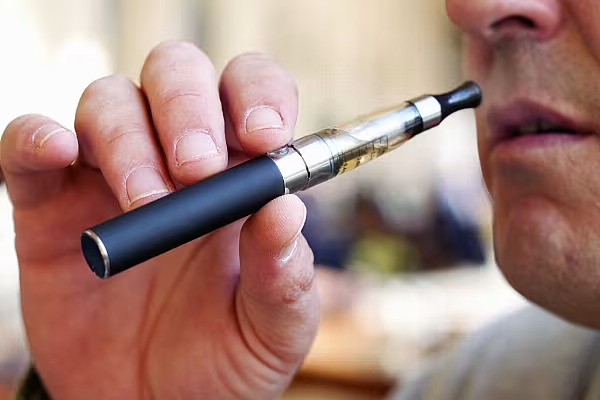The world may be better off with e-cigarettes than without them. Sort of.
Although a slew of studies have found the device serves as a gateway to cigarette use, such concerns may be exaggerated, according to a new study. Researchers in the U.S., Australia, and Canada have devised a model showing that, among people born after 1996, the option of using e-cigarettes may end up triggering a 21 percent reduction in smoking-attributable deaths and a 20 percent decrease in life-years lost.
Companies such as Altria Group Inc. and Reynolds American Inc. turned to vapor products as a solution to a serious problem: Their core product is flaming out. Health concerns have smokers increasingly trying to kick the habit, adding to a broader long-term decline in tobacco sales. And while electronic cigarettes aren't a panacea, having been linked to decreased immune response and heart disease, they are widely seen as less dangerous than smoking.
With that in mind, the study published Thursday in the journal Nicotine & Tobacco Research states that the number of traditional smokers who will quit, smoke less, or never start outweigh the fact that, for some, vaping leads to smoking and dual use. The journal, which says it's one of the world's few peer-reviewed journals devoted exclusively to the study of nicotine and tobacco, is funded by the Society for Research on Nicotine & Tobacco and published by Oxford University Press.
Despite the study's projections for the future, e-cigarettes have yet to do the trick for most people trying to quit the real thing. About three-quarters of adult e-cigarette users also smoke regular cigarettes, Brian King, a spokesman for the Centers for Disease Control and Prevention, said in November. And a recent study led by Terry Pechacek, a professor of health management and policy at the University of Minnesota, found e-cigarettes to be an ineffective alternative to cigarettes for most smokers. More than three-quarters of study participants didn't find e-cigarettes as satisfying as combustible cigarettes and stopped using the electronic version. Of those people, 95 percent rated e-cigarettes as less enjoyable than combustible cigarettes. (Tobacco companies are racing to create a more popular delivery mechanism.)
Even so, the study shows that combining vapor and combustible cigarettes may be better than smoking cigarettes alone. Using data from the National Health Interview Surveys administered by the U.S. Census Bureau from 1965 to 2012, the researchers applied projected rates for people to start and quit smoking. In doing so, they estimated the prevalence of long-term e-cigarette and cigarette smoking through the year 2083 to create their mathematical model.
E-cigarettes first went on the American market in 2007, so their long-term effects have been a mystery. One of the main differences between the new study and previous research is a focus on long-term e-cigarette use and the transition from not smoking to long-term smoking habits, said David Levy, lead author of the study and professor of oncology at Georgetown’s Lombardi Comprehensive Cancer Center.
“What we try to do is we look at more prolonged, established use, and we look at the studies and incorporate that into a model,'' he said. "We find that that makes a great deal of difference, so much so that the gateway hypothesis loses credence.”
Some aren't as positive about the rise of e-cigarettes. Thomas Wills, a professor of cancer epidemiology at the University of Hawaii Cancer Center, said Levy and his team may have overestimated the positive effects of e-cigarettes in helping people quit smoking. Wills has authored studies finding that e-cigarettes make adolescents more likely to start smoking cigarettes. Levy and his team argue their assumptions were actually conservative, since they would expect the relative risk of e-cigarettes to decrease over time because of new products and regulations.
The rate at which smokers switch to e-cigarettes is just one of many hurdles facing the $5.2 billion industry. The U.S. Food and Drug Administration began regulating e-cigarettes in May. FDA rules prohibit sales to minors, ban free samples, require package warning labels, and call for makers of products released after 2007 to seek FDA permission to remain on store shelves. Levy said the rush to regulate e-cigarettes closely may strangle their ability to supplant tobacco cigarettes in the marketplace.
“They’re going to make it difficult for certain producers of e-cigarettes to stay on the market,” Levy said.
News by Bloomberg, edited by ESM. To subscribe to ESM: The European Supermarket Magazine, click here.














